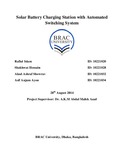| dc.contributor.advisor | Azad, A.K.M Abdul Malek | |
| dc.contributor.author | Islam, Rafiul | |
| dc.contributor.author | Hossain, Shakhwat | |
| dc.contributor.author | Showrav, Alaul Ashraf | |
| dc.contributor.author | Ayon, Asif Anjum | |
| dc.date.accessioned | 2014-09-16T10:56:46Z | |
| dc.date.available | 2014-09-16T10:56:46Z | |
| dc.date.copyright | 2014 | |
| dc.date.issued | 2014-08-28 | |
| dc.identifier.other | ID 10221020 | |
| dc.identifier.other | ID 10221028 | |
| dc.identifier.other | ID 10221032 | |
| dc.identifier.other | ID 10221034 | |
| dc.identifier.uri | http://hdl.handle.net/10361/3665 | |
| dc.description | This thesis report is submitted in partial fulfillment of the requirements for the degree of Bachelor of Science in Electrical and Electronic Engineering, 2014. | en_US |
| dc.description | Cataloged from PDF version of thesis report. | |
| dc.description | Includes bibliographical references (page 47). | |
| dc.description.abstract | In today’s environmentally conscious climate there is more and more interest being taken in alternative forms of power supply. Bangladesh is witnessing a significant increase in solar energy generation as a part of renewable energy generation as a safety net for the shortage of conventional power sources (coal, oil, gas etc.). Solar energy can be produced and converted to electrical energy via solar panels and then stored in batteries which can then be used for multiple household and commercial purposes. This project deals with the modified design of the pilot project, SBCS or Solar Battery Charging Station. This project is an attempt to assist the urban and rural areas with eco-friendly and cheap electricity supply, decreasing the load on the national grid in the process. The batteries charged in the process can also be used by electricity-driven rickshaws that will be helpful for those rickshaw pullers who are either old or physically handicapped. The implementation of the project includes charging 48-volts battery sets using two 200W solar panels providing discrete amount of power at different times of the day. In addition to that the project also includes an automated switching system by which the station will shift to backup power to charge the batteries if the solar irradiance is too low for the batteries to be charged in a given time constrain. This paper gives a full description of the charging process, both by the solar panels and by national grid. | en_US |
| dc.description.statementofresponsibility | Rafiul Islam,
Shakhwat Hossain,
Alaul Ashraf Showrav,
Asif Anjum Ayon, | |
| dc.format.extent | 47 pages | |
| dc.language.iso | en | en_US |
| dc.publisher | BRAC University | en_US |
| dc.rights | BRAC University thesis reports are protected by copyright.
They may be viewed from this source for any purpose,
but reproduction or distribution in any format is prohibited
without written permission. | |
| dc.subject | Electrical and electronic engineering | en_US |
| dc.subject | Solar battery | en_US |
| dc.title | Solar battery charging station with automated switching system | en_US |
| dc.type | Thesis | en_US |
| dc.contributor.department | Department of Electrical and Electronic Engineering, BRAC University | |
| dc.description.degree | B. Electrical and Electronic Engineering | |

